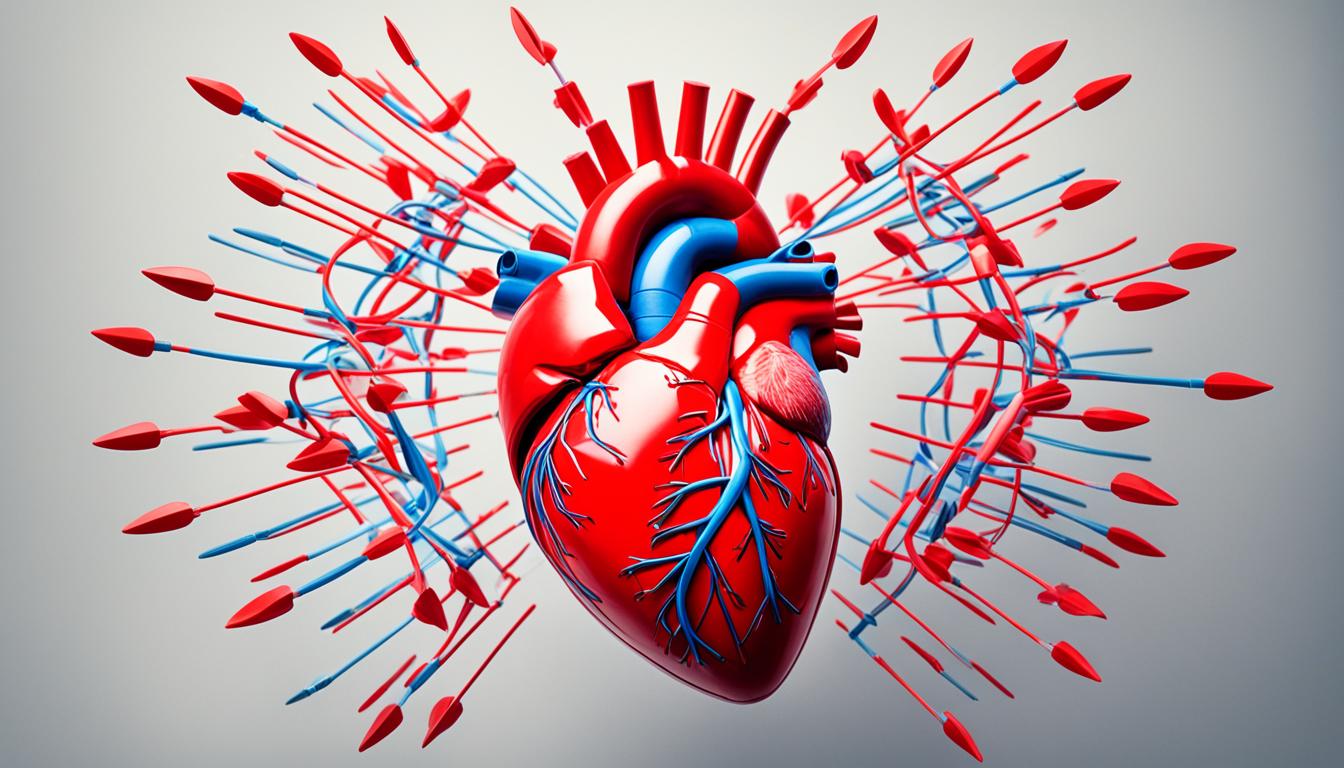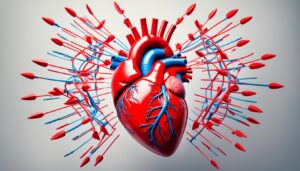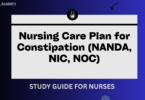You might be surprised to learn that more than 1. Is it true that 13 Million people across the globe have hypertension? This goes to show just how big the problem is. This is where nurses come in handy. They apply their skills in identifying and managing hypertension appropriately. This guide will equip you with the information and techniques to manage hypertensive patients. It is to enhance their health and well-being.
Key Takeaways
- Hypertension is a global health concern that has been reported to affect over 1. 13 billion people worldwide.
- Nurses play a crucial role in the care of patients with hypertension, using their professional judgment to determine the main nursing care priorities.
- It is important to know the risk factors, signs and the right measures to take when managing hypertension.
- The formulation of a detailed nursing care plan with the rest of the healthcare team is crucial in enhancing the patient’s results.
- Teaching and self-management practices are important in order to enable patients with hypertension to be more involved in their management.
Understanding Hypertension: A Nurse’s Perspective
Hypertension is one of the most prevalent conditions in the world, and as nurses, we play a crucial role in its management. This condition is called high blood pressure and it means that the blood pressure in arteries is too high most of the time. It is a big risk for heart diseases and that is why it is important for us, the healthcare workers, to be aware of it.
Definition and Prevalence
Hypertension is when your blood pressure is 140/90 mmHg or higher. According to the British Heart Foundation, approximately 28% of adults in the United States have it. It is more frequent in the elderly. Knowledge about hypertension enables us to comprehend the impact of the condition on patients.
Risk Factors and Causes
It is important for nurses to understand the causes of hypertension. Key factors include:
- Age: It is higher in those who are getting older, particularly those who are 65 years old and above.
- Family history: It is a fact that your genes can influence your blood pressure.
- Lifestyle: High blood pressure can be caused by eating the wrong foods, not exercising, being obese, stressed, or drinking too much alcohol.
- Underlying medical conditions: Certain conditions such as kidney disease, diabetes, and sleep apnoea can increase your risk of developing hypertension.
Understanding these factors enables the nurses to identify patients who are at risk and assist them to avoid or control hypertension. Knowledge about hypertension enables the nurses to be at the forefront in early detection, prevention, and control of hypertension. This knowledge assists in providing better care and also in interacting with the rest of the healthcare team. It is all about ensuring that the patient is taken care of in every aspect.
Nursing diagnosis in hypertension management
High blood pressure can be well managed if the right nursing diagnosis is made. It assists the nurses to make specific plans and coordinate with the rest of the healthcare team for the best outcomes for the patients. This part focuses on how nursing diagnosis is useful in the management of high blood pressure.
The care plan for hypertension is based on the nursing diagnosis for hypertension. It allows the nurses to observe the challenges that patients with high blood pressure go through. In this way, they can make their care more specific and enhance the effectiveness of managing hypertension. Nursing diagnosis in hypertension has significance. It helps nurses to:
- Identify the common causes of hypertension such as; lifestyle, other diseases, and the use of medicine as prescribed.
- Develop concrete steps to address the patient’s needs, such as altering behaviors, medications, or educating patients.
- Consult with the healthcare team, physicians, and other health care givers for a comprehensive and coordinated approach to managing hypertension.
- Monitor the patient’s condition and modify the care plan to achieve the best outcomes.
The role of nursing diagnosis in hypertension is enormous. Nurses are central to the nursing diagnosis in hypertension management through correct identification of nursing diagnoses. This results in improved blood pressure management, reduced complications, and improved quality of life for patients with hypertension.
Hypertension management is based on the nursing diagnosis, which allows the nurses to individualize the interventions and integrate with the rest of the healthcare team to provide the best results for the patient.
Nursing Diagnosis for Hypertension Patients
Nursing diagnosis are important for patients with hypertension and it is crucial to get them right. Nurses are best placed to identify what each patient requires. They develop care plans from these diagnoses.
Nursing Diagnosis That May Be Encountered in Hypertensive Patients.
There are specific nursing diagnosis that nurses identify in patients with high blood pressure. These include:
- Ineffective Tissue Perfusion: Reduced blood supply to organs leads to stroke or kidney failure.
- Imbalanced Nutrition: Not Just Body Needs: High blood pressure causes obesity and health issues.
- Deficient Knowledge: Patients may not understand how to cope with the illness or adhere to prescribed treatment regimens.
- Noncompliance: It is also challenging for patients to adhere to the prescribed treatment regimens. Nurses should spend more time with them and educate them.
- Anxiety: Managing hypertension is a stressful and anxious process for patients. Nurses have to assist with this.
Thus, by identifying these frequent nursing diagnoses, nurses can devise particular strategies for patients with hypertension. This can result in improved health status.
Nursing Diagnosis for Hypertension
Hypertension can therefore be managed well with the help of nursing diagnoses. It is important for healthcare workers to understand how to identify and manage the nursing diagnosis associated with this condition. In this section, we will focus on the key nursing diagnosis for hypertension, including assessment, changes, and interventions.
Hypertension is a common medical condition that has Ineffective Tissue Perfusion as one of the most common nursing diagnoses. It means that organs do not receive adequate blood supply, and this leads to injury and poor functioning of organs. The patient’s vital signs, skin color, and level of consciousness should be closely monitored by the nurses to identify signs of inadequate blood circulation.
Imbalanced Nutrition: Another common diagnosis is More Than Body Requirements. This is the case when people consume too much salt or do not have a proper weight due to high blood pressure. Nurses should assist the patients to take low sodium diets and explain to them why eating right reduces blood pressure.
- Concerns associated with the fact that hypertension is a long-term condition and may lead to complications.
- Disturbed Sleep Pattern because hypertension affects the cardiovascular system.
- Sedentary Lifestyle concerning the decreased physical activity that is commonly linked to hypertension.
The nursing diagnosis for hypertension assist the nurses in developing care plans that are appropriate for each patient. This approach, with evidence-based treatments, is important in improving the health of people with hypertension and their quality of life. Nursing diagnosis is therefore a critical component of the quality and patient-centered care of clients with hypertension. Nursing care planning is a critical component of the nursing process and is used to identify the patient’s problems, goals, and interventions.
The nursing care plan is crucial in the management of hypertension and should be well developed. Nurses are useful in selecting the right nursing actions and collaborating with the healthcare team. This makes sure that the patients receive the best services.
Prioritizing Nursing Interventions
In the case of hypertensive patients, it is important to pay attention to the nursing interventions that are relevant to the patient’s needs and the severity of the condition. It is necessary to evaluate the patient’s condition, possible contraindications, and expectations from the treatment.
- Determine the highest priority nursing diagnoses, including ineffective health management or risk for complications.
- Focus on the aspects that are most relevant to the patient’s situation, including blood pressure control, medication administration, and patient counseling.
- Create a long-term strategy for the patient to make necessary changes in his/her diet, physical activity, and stress levels.
Working with the Healthcare Team
It is therefore important that all health care workers should be able to work together in order to manage hypertension well. Nurses are central to this team and collaborate with doctors, pharmacists, dietitians, and other members. Combined, we make sure that care is patient-centered.
| Healthcare Professional | Collaborative Role |
| Physician | Provide medical diagnosis, prescribe and monitor medication |
| Pharmacist | Medication management, patient education on side effects and interactions |
| Dietitian | Develop personalized dietary plans to improve blood pressure control |
| Physical Therapist | Prescribe and monitor exercise programmes to support lifestyle modifications |
In collaboration with the healthcare team, nurses ensure that the care plan is in harmony with the patient’s comprehensive treatment plan. This results in improved patient health and a good life for the patients.
Nursing Interventions for Hypertension Management
Hypertension can be managed effectively with the help of nurses. Our interventions can go a long way in enhancing the health of patients. Now let us see how we can assist – from altering the life style to administering the medicines.
Lifestyle Modifications
Lifestyle modification is one of the ways of managing hypertension. Nurses can help patients by suggesting these changes: Nurses can help patients by suggesting these changes:
- Encouraging the consumption of low sodium diet with increased intake of fruits, vegetables and whole grains.
- Advising the patient to engage in moderate exercise like brisk walking, swimming or cycling depending on the patient’s condition.
- Helping with stress reduction strategies such as use of meditation, deep breathing exercises or directing the patient to a counsellor.
- Promoting smoking cessation and helping patients to stop smoking
Medication Management
Nurses play a significant role in the administration of hypertensive drugs. We work with the healthcare team to make sure patients get the right meds and stick to their plans:
- Informing the patients about the necessity of taking the prescribed medications and possible consequences.
- Supervising for any side effects or drug-drug interactions that may occur.
- Synchronizing medication renewals and dosing changes with the prescribing practitioner.
- Offering medication reconciliation and modifying the patient’s care plan accordingly
Thus, by paying attention to both the changes in the patients’ lifestyle and the medication intake, the nurses can significantly enhance the health of the patients with hypertension.
Monitoring and Evaluation
Treating hypertension in patients requires more than just prescribing drugs. It is important to monitor the progress of the patient. This makes sure that care is constantly improving and results in the best outcome. We will examine how nurses monitor patients and their status.
Assessing Patient Outcomes
The focus should be on the management of hypertension. Nurses are also important in monitoring the patient’s blood pressure frequently. This assists in determining whether the treatment is effective or not. This way, if the blood pressure changes, the nurses will be in a position to alter the care that is being offered.
One of the ways of assessing care is by looking at how well the patients are doing. Nurses monitor symptom control, adherence to medication, and whether patients have made any lifestyle changes. This assists in identifying what is effective and what requires more effort. It makes care better for everyone.
Monitoring patient status is a continuous process. Nurses look at the data they collect quite frequently. They identify trends, intervene early, and collaborate with the team to modify the care plans if necessary.
| Nursing Monitoring and Evaluation Hypertension | Frequency |
| Blood pressure measurement | Daily or as per healthcare provider’s instructions |
| Medication adherence | Daily |
| Symptom assessment | Daily |
| Lifestyle modifications | Weekly or as per healthcare provider’s instructions |
| Comprehensive evaluation | Monthly or as per healthcare provider’s instructions |
Nurses play a central role in ensuring that hypertension care is effective. In this way, they monitor and assess patients to enhance the results for all the patients.
Patient Education and Self-Management Strategies
In this case, as nurses, we are in a strategic position to educate patients with high blood pressure on how to go about it. Patient education hypertension nursing is essential. It assists people in comprehending the significance of maintaining a healthy blood pressure. They learn how to manage it well.
It is important to have knowledge about self-management of hypertension nursing for proper care. Patients need to know the fundamentals of hypertension. This includes the causes, risk factors, and possible complications of the condition. It enables them to be in control of their health and make the right health decisions.
In patient education hypertension, one of the main responsibilities of nurses is to assist patients to live healthier lives. This means:
- Encouraging the consumption of fruits, vegetables, and whole grains in their daily meals.
- Promoting physical activity and exercise as a part of daily routine.
- Stressing the need to adopt stress management strategies.
- Providing guidance on the correct usage of blood pressure drugs
Self-management strategies hypertension: It is crucial to enable patients to manage their condition on their own. In this way, providing them with full education and support, we contribute to their skill and confidence acquisition. They can monitor their blood pressure, identify signs and symptoms, and make appropriate decisions regarding their health. Patient education and self-management are the key components of the management of hypertension.
Patients, their families, and the healthcare team can collaborate with nurses for a comprehensive self-management nursing plan for hypertension. In this way, patient education and self-management improve the quality of life of patients with high blood pressure. This leads to better long-term results.
Addressing Comorbidities and Complications
Nurses attending to patients with high blood pressure should be on the lookout for other health complications. Hypertension is a major risk factor for heart and kidney diseases. These complicated health issues are well handled by nurses.
Cardiovascular Diseases
Hypertension results in heart and blood vessel complications. Nurses should be aware of these issues and look for signs of them. They assist the healthcare team in order to assist the patients. This involves educating patients on how to lead healthier lives, ensuring that they adhere to their medication regimens, and collaborating with cardiologists for comprehensive care.
Kidney Diseases
Hypertension is a risk factor for chronic kidney disease or even kidney failure because it damages the kidneys. Nurses have to monitor the kidney status and see if there are any issues. They collaborate with nephrologists in the management of these diseases. This might mean administering medicines, altering diets, and monitoring for kidney disease to worsen.
FAQ
What is the meaning of hypertension?
Hypertension is a chronic disease that is characterized by high blood pressure. It is when the first number, known as systolic pressure, is 140 or above or the second number, diastolic pressure, is 90 or above.
What are the causes of hypertension?
Some of the risk factors include age, family history, being overweight, lack of exercise, high salt intake, alcohol consumption, and conditions such as diabetes and kidney disease.
How does nursing diagnosis fit into the management of hypertension?
High blood pressure is one of the most common health conditions that can be managed through nursing diagnosis. It assists the nurses in identifying specific interventions, collaborating with the rest of the healthcare team, and evaluating the progress of the patients.
What are the most frequently used nursing diagnosis for hypertensive patients?
Some of the most frequent diagnosis for high blood pressure patients include noncompliance to treatment, inadequate circulation, fluid overload, reduced tolerance to activities, and noncompliance to advice.
In what ways can nurses prioritize the nursing interventions for hypertension management?
Nurses should assess the patient’s health status, identify the areas that require attention and develop a comprehensive care plan. This plan should include changing the patient’s lifestyle, handling medications, and monitoring the patient.
What is the nurse’s responsibility in patient education regarding hypertension?
Nurses educate patients on high blood pressure, enabling them to manage their condition and make proper decisions. They provide guidance on how to take medicines, change the diet, and exercise.
What strategies can be used by nurses to manage the comorbidities and complications of hypertension?
Nurses should be aware of the health complications that are associated with high blood pressure such as heart and kidney diseases. They are part of the healthcare team, monitor patients, and utilize particular interventions to assist patients in recovering.








